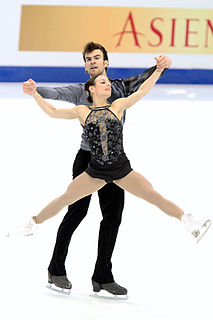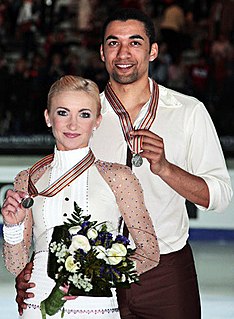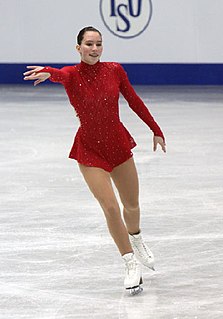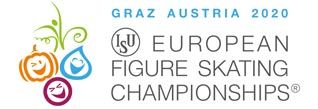
Stéphane Lambiel is a Swiss former competitive figure skater who now works as a coach and choreographer. He is a two-time (2005–2006) World champion, the 2006 Olympic silver medalist, a two-time Grand Prix Final champion, and a nine-time Swiss national champion. Lambiel is known for his spins and is credited with popularizing some spin positions.

Ingo Steuer is a German pair skater and skating coach. With Mandy Wötzel, he is the 1998 Olympic bronze medalist, the 1997 World champion, the 1995 European champion, and a four-time German national champion. As a coach, he led Aliona Savchenko and Robin Szolkowy of Germany to multiple world and European titles.

The Four Continents Figure Skating Championships (4CC) is an annual figure skating competition. The International Skating Union established it in 1999 to provide skaters representing non-European countries with a similar competition to the much older European Figure Skating Championships. The event's name refers to Africa, the Americas, Asia and Oceania. Medals are awarded in the disciplines of men's singles, ladies' singles, pair skating, and ice dancing.

The European Figure Skating Championships is an annual figure skating competition in which figure skaters compete for the title of European champion. Medals are awarded in the disciplines of men's singles, women's singles, pair skating, and ice dance. The event is sanctioned by the International Skating Union (ISU) and is the sport's oldest competition. The first European Championships was held in 1891 in Hamburg, Germany and featured one segment, compulsory figures, with seven competitors, all men from Germany and Austria. It has been, other than four periods, held continuously since 1891, and has been sanctioned by the ISU since 1893. Women were allowed to compete for the first time in 1930, which is also the first time pairs skating was added to the competition. Ice dance was added in 1954. Only eligible skaters from ISU member countries in Europe can compete, and skaters must have reached at least the age of 15 before July 1 preceding the competition. ISU member countries can submit 1-3 skaters to compete in the European Championships.

Robin Szolkowy is a retired German pair skater. With partner Aliona Savchenko, he is the 2010 and 2014 Olympic bronze medalist, a five-time World champion, a four-time European champion, a four-time Grand Prix Final champion, and an eight-time German national champion.

Aljona Savchenko is a Ukrainian-born German pair skater. One of the most decorated pair skaters, she is the 2018 Olympic Champion and a two-time Olympic bronze medalist, a six-time World Champion, a four-time European Champion, and a five-time Grand Prix Final champion.

Kiira Linda Katriina Korpi is a Finnish figure skater. She is a three-time European medalist, the 2010 Trophée Eric Bompard champion, the 2012 Rostelecom Cup champion, a two-time Cup of China medalist, and a five-time Finnish national champion. She retired from competitive skating in August 2015.

Tomáš Verner is a former Czech figure skater. He is the 2008 European champion, a medalist at two other European Championships, and a ten-time Czech national champion. He has won six senior Grand Prix medals, including the 2010 Cup of Russia title.

Nelli Nailevna Zhiganshina is a Russian-born German ice dancer. With Alexander Gazsi, she is a six-time German national champion and has won twelve international medals. They have placed as high as 6th at the European Championships and 10th at the World Championships.

Sarah Stefanie Hecken is a German retired figure skater. She is a four-time German national champion and has won twelve senior international medals, including six gold. She has placed as high as 11th at the World Championships. Her first international victory was at the 2007 Junior Grand Prix event in Germany.
The 2013–14 figure skating season began on July 1, 2013, and ended on June 30, 2014. During this season, elite skaters competed at the Olympic level in the 2014 Winter Olympics and at the ISU Championship level in the 2014 European, Four Continents, World Junior, and World Championships. They also competed in elite events such as the Grand Prix series and Junior Grand Prix series, culminating in the Grand Prix Final.

Bruno Massot is a French-German retired pair skater. Competing with Aljona Savchenko for Germany, he is the 2018 Olympic Champion, the 2018 World Champion, a two-time European silver medalist, and two-time German national champion.
The 2014 European Figure Skating Championships was a senior international figure skating competition in the 2013–14 season. The competition was held in Budapest, Hungary from January 13 to 19th, 2014. Skaters competed in the disciplines of men's singles, ladies' singles, pair skating, and ice dancing.
The 2015 European Figure Skating Championships were held 26 January – 1 February 2015 in Stockholm, Sweden. Medals were awarded in the disciplines of men's singles, ladies' singles, pairs, and ice dancing.
The 2014 German Figure Skating Championships was held on December 14–15, 2013 at the Erika-Hess-Eisstadion in Berlin. Medals were awarded in the disciplines of men's singles, ladies' singles, pair skating, and ice dancing on the senior, junior, and novice levels. The results were among the criteria used to choose the German teams to the 2014 Winter Olympics, 2014 World Championships, and 2014 European Championships.
The 2016 European Figure Skating Championships were held 25–31 January 2016 in Bratislava, Slovakia. Medals were awarded in the disciplines of men's singles, ladies' singles, pairs, and ice dancing.
The 2017 European Figure Skating Championships were held 25–29 January 2017 in Ostrava, Czech Republic. Medals were awarded in the disciplines of men's singles, ladies' singles, pairs, and ice dancing.
The 2015 Russian Figure Skating Championships was held from 24 to 28 December 2014 in Sochi. Medals were awarded in the disciplines of men's singles, ladies' singles, pair skating, and ice dancing. The results were among the criteria used to select Russia's teams sent to the 2015 World Championships and 2015 European Championships.

The 2018 European Figure Skating Championships were held in January 2018 in Moscow, Russia. Medals were awarded in the disciplines of men's singles, ladies' singles, pairs, and ice dance.

The 2020 European Figure Skating Championships were held in Graz, Austria, on 20–26 January 2020. Medals were awarded in the disciplines of men's singles, ladies' singles, pairs, and ice dance. The competition determined the entry quotas for each federation at the 2021 European Championships.












